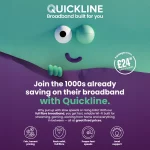EU Study Claims Satellite Broadband is an “efficient option” for Remote Schools
A new study published by the European Commission has found that Satellite based broadband connectivity is an “efficient option” for bringing faster internet connectivity to “poorly connected” schools. A voucher scheme is proposed to help support related deployments.
The study considers that a school is in the Digital Divide if it cannot have terrestrial broadband access able to deliver at least 2Mbps (Megabits per second) per school, although these days we’d suggest that a higher speed might still signify being in the divide (i.e. even 10Mbps, when shared between lots of pupils and staff in today’s modern environment, would be a major struggle, especially if the upstream is slow).
The report uses several case studies to show that broadband Satellite solutions have “often provided a significant step forward in terms of connectivity to both primary and secondary schools with no internet connectivity or with connectivity lower than 6-8 Mbps.” This is important because around 25% of schools in the EU still “lack broadband access” (2016 data).
Advertisement
Satellites are effectively small autonomous space stations that are launched into orbit around the Earth by a powerful rocket and used as specialised wireless transceivers (receiver/transmitters) to relay information between different points on the ground. The high altitude above our planet gives them exceptional coverage (nearly universal), which is especially useful in remote rural areas.
As part of its evidence, the study also highlights some of Ofcom’s research in the UK, which found that “for many applications a high access speed (bandwidth) may be less important than a stable, qualitative connection with a fair access speed of around 5-10 Mbps.” However in this context the regulator was referencing individual connectivity and not a large / shared multi-user environment, such as a school.
The report does admit that Satellite may be better viewed as a temporary solution that can “serve the schools located in unserved or underserved areas, while waiting for a potential deployment of terrestrial, very high-speed access which however may take several (or many) years.” We’d agree, provided temporary is the key word.
Extract from the EC Study
“Notwithstanding the above, the needs for internet access speed and quality are increasing along with the evolution of the digital applications and the consumption pattern. In particular, video services, live-streaming of seminars and lectures as well as different types of rich content are very much driving this surge in consumption of many applications across computers, smartphones, tablets, TV and other devices, and the case studies have confirmed this trend in the educational environment too (e.g. access to dedicated digital content stored and shared in a cloud or remotely).
The support of these evolving needs is often associated with the deployment of fibre. Indeed public initiatives to develop very-high-speed access for all, namely those including the provision fibre connections to primary and secondary schools, will be implemented gradually, and for some schools in the most rural areas, fast broadband will only be accessible in several years, as the geographical dispersion of schools does not allow for the installation of fibre-based networks on all sites in the short-term.
Satellite services can provide a solution to serve the schools located in unserved or underserved areas, while waiting for a potential deployment of terrestrial, very high-speed access which however may take several (or many) years. This provision of services needs to cope with the evolution of user demands and needs.
In this respect, a hybrid solution that combines broadcast networks for distribution with broadband networks for interactivity, can deliver video-based services, applications, content and products everywhere, even in rural and remote areas, in a less costly and quicker-to-market complementary way, namely through a local storage and sharing of “heavy” content (magazines and e-Books, videos, etc.).”
In our view Satellite remains an inferior connectivity method due to a number of major stumbling blocks, such as slow latency performance, high setup costs, meagre + expensive data allowances and the fact that traffic throttling or congestion (especially at peak times) can often reduce an attractive top speed down to something significantly slower.
Advertisement
The study appears to recognise some of the technologies pitfalls compared to fibre-based broadband, although it also claims that Satellite still has a few advantages (some may disagree with a few of the following points).
EC Study – The Advantages of Satellite
* Predictable and stable quality of service everywhere, regardless of geographic location.
* Simple and quick deployment of satellite broadband at the customer premises.
* Favourable deployment costs.
* High reliability and security.
We should point out that faster Satellites, which may be able to offer speeds of up to 100Mbps and bigger data allowances, are due to be introduced over the next few years and that might well help to support the case for their use. Similarly the EC’s report proposes that a voucher scheme could be used to help tackle the cost side of things.
The idea of a voucher scheme to help balance the costs of a Satellite setup (i.e. hardware and installs can easily reach around £500 a pop) is of course nothing new and the Government has already introduced something similar via their Better Broadband Subsidy Scheme, which offers grants worth up to £350 to those in sub-2Mbps areas who aren’t currently planned to benefit from a fixed line upgrade. Wales also has a similar scheme of its own.
However the UK’s BBSS scheme is due to conclude at the end of 2017 and that’s partly needed in order to avoid conflicting with the Government’s proposed Universal Service Obligation (USO) for broadband. The USO will aim to make available a minimum download speed of 10Mbps (1Mbps upload), and at least a 100GB usage allowance, to every part of the country (details).
Advertisement
A related USO proposal from BT envisages that by the end of 2021 or 2022 some 99%+ of UK premises will be covered by their fixed line “fibre broadband” (FTTC/P) network, with fixed wireless technology being used to fill many of the remaining gaps and around 0.3% of the most remote premises needing to adopt a Satellite solution.
Meanwhile the EC’s study appears to seek a similar voucher scheme to the BBSS one above for Satellite and suggests that it should support services “with capacity of at least 20 Mb/download (6 Mb/s recommended).” The EU has also proposed to introduce their own USO for broadband, which aims to complement their non-binding commitment for “all European households” to get a minimum Internet download speed of 100Mbps+ by 2025 (here).
Obviously Brexit means that the UK probably won’t be a party to what the EC proposes, although the UK’s planned 10Mbps USO should produce a similar outcome for properties in the most remote locations.
EC Study – Satellite Broadband for Schools (PDF)
http://ec.europa.eu/newsroom/document.cfm?doc_id=46134
Mark is a professional technology writer, IT consultant and computer engineer from Dorset (England), he also founded ISPreview in 1999 and enjoys analysing the latest telecoms and broadband developments. Find me on X (Twitter), Mastodon, Facebook, BlueSky, Threads.net and Linkedin.
« Three UK Formally File for a Judicial Review of Ofcom’s Spectrum Auction

















































Comments are closed